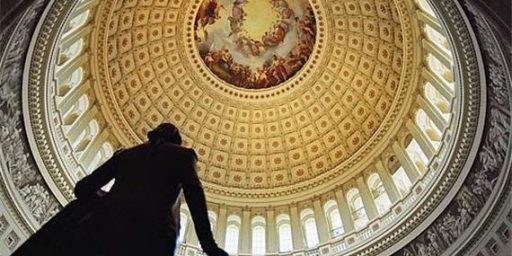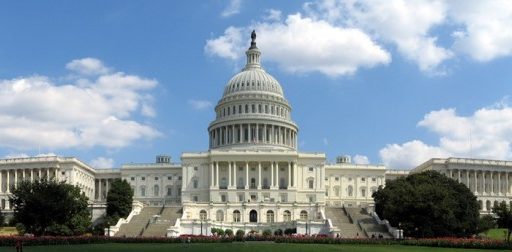World Reacts To U.S. Debt Downgrade
Like the rest of us, financial analysts across the globe are trying to figure out what the U.S. debt downgrade means.
Markets won’t be open until Monday, but the world is already starting to react to S&P’s decision to downgrade U.S. sovereign debt:
PARIS — Europe was taken aback Saturday at the unprecedented downgrade of America’s sterling sovereign credit rating, as officials of the Group of 7 industrial countries decided whether to hold an emergency conference call to discuss the debt crisis that has beset Europe and the United States.
While officials in both Europe and Asia had girded for such a possibility, the news that Standard & Poor’s had lowered Washington’s AAA rating to AA+ was nonetheless received with a degree of concern in the corridors of power on the Continent.
The French finance minister, François Baroin, questioned the move Saturday, which he said appeared to be based on “nonconsensual figures.” The Obama administration had disputed the judgment, noting that Standard & Poor’s had made a significant mathematical mistake and overstated the federal debt by about $2 trillion.
Standard & Poor’s said the downgrade was based more on the view that the effectiveness, stability and predictability of American policymaking had eroded during the rancorous debate over lifting the debt ceiling. Mr. Baroin said he found it curious that neither Moody’s nor Fitch, the two other major ratings agencies, had reached a similar conclusion. Moody’s has said it was keeping its AAA rating on the nation’s debt, but that it might still lower it.
“We have total confidence in the solidity of the American economy,” Mr. Baroin said in an interview on French radio. Nonetheless, he added, the decision “confirms” that the world’s most developed economies are confronted with the same urgent priorities: to lift growth and reduce public and private debt.
The Australian prime minister also warned against overreacting to the downgrade.
Standard & Poor’s “had been signaling for some time that unless they saw a certain figure of budget cutbacks out of the discussion that there’s been in Washington about the American budget and fiscal consolidation, that they were intending to do that downgrade,” Prime Minister Julia Gillard said, according to Agence-France Presse. “At the same time, the other two major ratings agencies, Moody’s and Fitch, continue to have the American economy rated at AAA. So I think people just need to look at all of the facts.”
Japan’s reaction was also more muted, according to media reports. Officials in Tokyo said their trust in American Treasuries remained unchanged.
In Germany, however, commentators saw the downgrade as further evidence of the decline of American prestige.
The weekly newsmagazine Focus called the downgrade “a public humiliation.”
The Chinese were equally blunt:
SHANGHAI — China, the largest foreign holder of United States debt, said Saturday that Washington needed to “cure its addiction to debts” and “live within its means,” just hours after the rating agency Standard & Poor’s downgraded America’s long-term debt.
The harshly worded commentary, which was released by China’s official Xinhua news agency, was Beijing’s latest effort to express its displeasure with Washington.
Beijing’s reaction to the downgrade was the harshest among foreign leaders.
Officials in Japan and France said their faith in the United States government remained strong. The Australian prime minister, Julia Gillard, warned against overreacting, while the Indian finance minister, Pranab Mukherjee, said the downgrade had created a “grave” situation, one that would require some time to analyze.
Though Beijing has few options other than to continue to buy United States Treasury bonds, Chinese officials are clearly concerned that the country’s substantial holdings of American debt, worth at least $1.1 trillion, are being devalued.
“The U.S. government has to come to terms with the painful fact that the good old days when it could just borrow its way out of messes of its own making are finally gone,” read the commentary, which was published in Chinese newspapers.
Beijing, which did not release any other official statement on the downgrade, called on Washington to make substantial cuts to its “gigantic military expenditure” and its “bloated social welfare” programs.
The commentary serves as a sharp illustration of how the United States’ standing in the world is sliding and how China now views itself as ascendant.
In The Telegraph, David Buik sees the downgrade as evidence of the financially illiteracy of the United States but doesn’t see it having a major impact on the world economy:
What does this mean to the man in the street? It will be hoped that this downgrade will not precipitate higher interest rates. Personally, I don’t think it will.
No doubt this counterproductive initiative taken by S&P and at the time of writing yet to be endorsed by Moody’s or Fitch, will briefly create further turmoil and volatility on Monday morning, but it may be short-lived.
Why? The world’s economy is so brittle that it cannot sustain high interest rates.
The US Treasury market is the best supported and most liquid market in the world with the likes of China, Japan and Russia massive holders.
It was interesting to note that when S&P threatened a downgrade, yields on US Treasuries actually fell quite sharply – in other words, the cost of borrowing seemed unimportant as fearful investors deserted equities in their droves..
S&P has a duty of care, but its timing was disastrous. However this stark news may well prove a timely wake up call as to the damaging effect of global debt – EU politicians, you have been warned.
Buik may be correct, for several reasons. United States Treasuries have long been the investment of choice for investors looking for a safe place to put their money. During last week’s market downturn, for example, traders will pulling money out of stocks and putting them in U.S. bonds to such a large degree that the yield on 10 year notes actually went down (a bond’s yield tends to move in the opposite direction of its price). Will this type of a flight to quality change now that the U.S. had been downgraded? Perhaps some investors will diversify their holdings into Gold or Swiss Francs, but it seems unlikely that there would be a sudden movement out of T-Bills simply because there aren’t many other places to go.
Nonetheless, this is a profound psychological change and it’s likely to take the market time to react to it. The real question is how the United States is going to react to this. This should be a Sputnik moment, a moment when our political leadership and citizenry is so shocked that they are compelled to act. It should be, but I’m not sure its going to be. So far, all we’re seeing from politicians and pundits is finger pointing as they try to pin the blame for this on the other side. That’s the wrong way to look at it, and if that’s what we end up doing then we’re going to see more days like yesterday.







Surely the Europeans must fear for their own ratings. That is probably one of the “follow-on effects” they are considering.
It is imperative that the United States adopts a fiscal policy that will keep its sovereign debt within acceptable limits, not only for America as a whole but also for global economic stability. One area of cutback needs to be foreign aid, particularly that aid that is used for military and political purposes, as opposed to humanitarian relief.
In this context, the US$30 Billion that is given to Israel each year under an agreement made by the failed former president, GW Bush, with Israel’s right-wing government, should be immediately scrapped.
These monies, for which Israel is apparently completely unaccountable, amount to $8.2 Million A DAY, or US$500 a year for every man, woman and child.
It is not known whether there are any other questionable payments of such magnitude, but it is unlikely given that there is no other pressure group as powerful as that of the American Israeli lobby, that could conceivably demand and obtain such funding from Congress for a foreign state that is of no strategic or security benefit whatsoever to the American people.
JRDK
A lot of people trying to spin this as about spending but it is not. It is about debt, the deficit. The deficit can be closed by either cutting spending or raising taxes or some combination of both. S&P stated that they doubt the ability of the US to raise taxes as one of main reasons for this downgrade. But poll after poll has shown the US people are ready for a combination of tax increases and spending cuts. The current republican house wont go for the tax hikes but there is an election coming that can change that.
This thing stinks. First a math error, then never mind the math error. S&P has been horrible at estimating risk of debt, witness what they had Lehmans rated at one day before they went under.
So a discredited agency lower the rating based on bad math and questionable political analysis. Dont be surprised if the market reaction is a big yawn. S&P is not taken very seriously by Wall Street. They know how the game is played with the rating agencies.
One of the first reactions that came in from China after the debt ceiling deal was this:
China says debt financing unlikely to save US, EU
I particularly liked their symbolism of eating “May’s grain in April,” because that is what the US has been doing by broadening their social programs’ investments, without prudently paying as much attention to nourishing the private business sector which directly feeds such government expenditures.
And,” broadening” is an accurate, just word to use when referring to Obama’s share of the debt, bringing about our downgrading.
Obama partisans ignore facts when bashing Bush
Certainly there were deficits galore during both party’s administrations. But, they significantly rose when the dems had the most power, from 2007, onward. After all, President Obama’s $800 billion-plus stimulus package was passed by Congress in early 2009 on a mostly party-line vote. It was followed in April by his $3.5 trillion budget, enacted without a single Republican. ….and, the spending just continued, along with unemployment, a stagnating economy, companies pulling up stakes and leaving. Basically, Obama has done little to nothing positive to stem the flow of uneasiness under his 30+ month rule.
Jan…if I believed in God I would pray to her in your behalf. Your views are so strongly held, yet based on completely mistaken and mi-interpreted information. The largest part of the deficits and debt going forward is from Bush policies and obligations. The stimulus was a short-term event made necessary by the crash of ’07. Bush policies continue to impact us. Unpaid for tax cuts, unpaid for wars kept off the books, unpaid for entitlement expansion. Look at the graph of future deficits…it’s almost all Bush tax cuts, whic Tea Stains refuse to address and S&P is saying we must. The Simpson/Bowles commission, the Gang of Six, and Obama/Boehners Grand Bargain were pretty much all the same and would have satisfied the ratings agency. Boehner in the end could not deliver the Tea Stain caucus because they refused to address revenues in any way and insisted on an impossible Constitutional amendment.
But keep making stuff up if it makes you feel better about your failed ideology.
I love this meme that Demcrats were in power in 2007. This is the same denial mentality that makes it possible for Republicans to refuse to accept any share of responsibility for 9.11. To me it’s a sign of weakness. Like Boehner whining about debt but never accepting responsibility for the votes he made that created that debt. They’re just wusses. Pathetic wusses.
The short term deficit is significantly composed of revenue shortfalls, but the short term deficits, which the right focus upon are not our real problem. Long term debt, composed largely of health care costs is where we need to focus.
China is correct that we need to stop running up debt even when the economy is going well (see every US GOP president since 1980.) We also need to give up dependence on debt financing at the personal level.
Steve
Oddly enought, it also means that the GOP is in power now, and what they’re calling the Obama deficit is a misnomer, since the deficit by their reckoning belongs to congress rather than to the president, and the GOP has held congress during a third of Obama’s presidency.
You can call debt congressional or presidential – a case can be made either way. However, if you switch between the two depending upon who’s in power then you’re just playing silly political games, and will of course be laughed at.
@jan: Jan,
Your quick embracing of China’s rebuke of the US reminds me of exactly what I hate about partisan ideologs — and in particular Conservative ones. I’m sure that on most other issues you would consider it unpatriotic to embrace with a “hostile” country’s point of view. For example look back to how much conservatives attacked Obama for his supposed “Apology Tour” in the Muslim world.
And yet, when our chief global rival attacks your political opponent, you embrace their “wisdom” with open arms. Imagine how you might have reacted if, during Iran Contra, a democrat had suggested that a Soviet rebuke of Regan had merit. Imagine a Liberal quoting Pravda as a non-biased source.
Beyond that, I’m wondering how you support China’s suggestion that the US should — to help solve its debt problem — slash it’s military spending (note the presence of an “AND” in their editorial:
or how about China’s call for international regulation of the dollar?
The solution requires both spending cuts and tax hikes. It’s politically impossible to get one without the other, and neither would be adequate to deal with the problem alone anyway.
That’s the hard reality. I’m sick of politicians pretending that it isn’t, and of people who will vote for anyone who panders to their fantasies.
they didn’t downgrade the debt as bad as it really is. just like they didn’t do with the CDO’s before the housing market crashed. betcha the banks aren’t betting on us treasuries going up..
http://youtu.be/m4WNGTPG0v8
@Hey Norm:
Norm, it’s ok. I expect you to disagree with me. If you didn’t then I would think something was askew with the analysis put forth. Whew, so far so good.
@mattb:
“International supervision over the issue of U.S. dollars should be introduced and a new, stable and secured global reserve currency may also be an option to avert a catastrophe caused by any single country. ”
And the path to a one world government is being laid brick by brick.
@mattb:
Hey, wasn’t the subject matter of this thread all about relaying other country’s reactions to our downgrade? And, that is what I did with the China excerpt and link. Was there anything in my post that said I embraced anything that China stood for?
What I did find especially poignant, though, catching my eye, was the visual of eating ‘May’s grain in April.’ I thought that was beautifully phrased, a gentle analogy to what we are doing and alluded to that in my post.
But, as usual you cherry pick posts, and in this case extend points and insinuations into areas I didn’t travel. But, as It is important for you to debase another’s opinion, you skirt the margins of sarcasm, content and hyperbole to do this.
BTW, China is both an unsettling friend and foe of ours. A friend, because we unfortunately need and are borrowing their money. A foe because they are waiting for us to falter and collapse, as they want to supercede us becoming the number one super power. And, as we cut back on our military and space exploration, while China is furiously adding to their navy and expanding their space program, this may happen sooner rather than later.
I not pleased about this possibility. Are you?
No Jan…you put forth typical extreme right wing talking points not based in fact. Quotin Byron York? He was one og Bushs biggest cheerleaders in running up this debt.
@John RD Kidd: I get it. You don’t like aid to Israel. Now my question is the following: do you have 600 more of these “outrages” for the balance of the 1.6 trillion or are you just another one-note serenade?
Jan,
To be fair, in rereading your post I note that you simply liked the analogy.
At the same time, in using it, you used it to once again beat the tired drum that this is all about the “broadening their social programs’ investments” (your words). I found that ironic as any honest commentator would acknowledge that this has been about the unrestrained broadening of social programs AND military spending (see this chart from the Heritage Foundation for proof of how we continue to spend more on the military than in any point in our history with the exception of WWII – http://www.heritage.org/research/reports/2010/06/us-defense-spending-the-mismatch-between-plans-and-resources). That immediately made me think of how the Chinese are calling for that reduction.
As far as the question you asked:
On Military spending, considering we outspend the Chinese by a factor of 6! (source: we could cut that spending in half without threatening out supposed military “dominance” (whatever that means in an age of asymmetrical warfare). The question of space exploration is a bit more difficult for me. I think it is problematic that we [the US] don’t have a replacement for the shuttle program. That said, I also tend to think that if we’re just setting our sites on orbital space, then it’s probably just as well to start concentrating on development of the private space industry. And given the general necessary belt tightening, I’m willing to give that up if it means helping reduce the debt. That said, I think the US could more effectively spark R&D through a lot of targeted grant programs.
As far as the fear of China surpassing the US any time soon, I think these concerns are typically overblown. Given that China is far more fragile internally than most people realize, they will soon be experiencing a LOT of growing pains (many of which they have successfully hid from general discussion for quite a while). Ditto India. Both nations have a lot of potential, but are full of brewing social and ethnic problems that have the potential to cause huge issues in the decades to come.
BTW, the source on the US outspending China by a factor of 6 was for 2010 and based on this link: http://www.rickety.us/2011/06/2010-defense-spending-by-country/
In doing a bit more research, I found this page which suggests that for 2011 China will have upped its expenditures to the point that were only approximately doubling what they spend:
http://www.globalsecurity.org/military/world/spending.htm
@Jib:
You Stated…..”A lot of people trying to spin this as about spending but it is not. It is about debt, the deficit. The deficit can be closed by either cutting spending or raising taxes or some combination of both. S&P stated that they doubt the ability of the US to raise taxes as one of main reasons for this downgrade. But poll after poll has shown the US people are ready for a combination of tax increases and spending cuts..”
To say its NOT a spending problem seems a bit blind….It’s like saying that your “household doesn’t have a spending problem” when you spend more money than what you bring home in a monthly income, and so you just go get another credit card to charge your bills on, and so it creates more revenue that you will some day have to pay back, but you continue to spend today at higher rates. Instead, your solution is to go out and get another job (taxes), so that you can keep spending. Eventually however, you will run out of hours available to work, and will be FORCED to cut your spending. My point is that TAX dollars are NOT unlimited…eventually there won’t be enough money to support the continued growth of spending, even if everyone was taxed at 100%…..We are living beyond our means.
No one ever claimed that tax dollars are unlimited…that is a false argument…rather, the claim is that we will have to have spending cuts and tax increases to get our fiscal house in order…